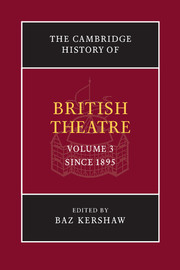Book contents
- Frontmatter
- Part I 1895–1946
- 1 British theatre, 1895–1946: art, entertainment, audiences – an introduction
- 2 The London stage, 1895–1918
- 3 Provincial stages, 1900–1934: touring and early repertory theatre
- 4 Popular theatre, 1895–1940
- 5 Case study: Cicely Hamilton’s Diana of Dobson’s, 1908
- 6 A critical year in perspective: 1926
- 7 The London stage, 1918–1945
- 8 Social commitment and aesthetic experiment, 1895–1946
- Part II Scottish and Welsh Theatres, 1895–2002
- Part III 1940–2002
- Bibliography
- Index
- References
3 - Provincial stages, 1900–1934: touring and early repertory theatre
from Part I - 1895–1946
Published online by Cambridge University Press: 28 March 2008
- Frontmatter
- Part I 1895–1946
- 1 British theatre, 1895–1946: art, entertainment, audiences – an introduction
- 2 The London stage, 1895–1918
- 3 Provincial stages, 1900–1934: touring and early repertory theatre
- 4 Popular theatre, 1895–1940
- 5 Case study: Cicely Hamilton’s Diana of Dobson’s, 1908
- 6 A critical year in perspective: 1926
- 7 The London stage, 1918–1945
- 8 Social commitment and aesthetic experiment, 1895–1946
- Part II Scottish and Welsh Theatres, 1895–2002
- Part III 1940–2002
- Bibliography
- Index
- References
Summary
In the queer nondescript world of the theatre – neither art nor trade – today is a time of unrest …The old unhasting dynasties find themselves less secure …new managements are essayed …and there is a general disposition towards experiment …New theatres spring up, each more palatial than the last, as often as not in a world that has no use for them …There is even talk of a New Drama to put in them …and …the proud predominance of London itself …has been rudely shaken by a growing disposition on the part of the provincial capitals to provide a drama for themselves.
P. P. Howe’s description of the state of British theatre in the last years of the Edwardian era is, with hindsight, both true and misleading. What is missing from his view is the later perception that this was both a luxuriant, golden era for theatre and a period of ideological and aesthetic ‘revolution’. Critics and chroniclers, born in the late nineteenth century and growing up in the British provinces, often write with passion of their early experiences of the actor-managers who visited their towns and cities. But they also decry the commercial ‘revolution’ that mostly destroyed the actor-manager system after World War One, as well as championing the fragmented experiments that brought about another type of ‘revolutionary change in the character of the theatre’ in Britain. Allardyce Nicoll describes this new theatre as ‘possessed of an animating spirit the like of which the nineteenth century … had never known.’
- Type
- Chapter
- Information
- The Cambridge History of British Theatre , pp. 60 - 85Publisher: Cambridge University PressPrint publication year: 2004
References
- 1
- Cited by



